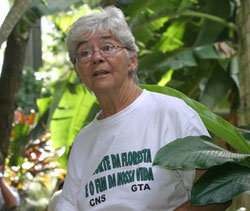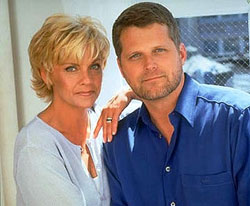 We all know that sustainability is a serious issue, but the documentary “They Killed Sister Dorothy” reminds us that it is deadly serious.
We all know that sustainability is a serious issue, but the documentary “They Killed Sister Dorothy” reminds us that it is deadly serious.
A Sisters of Notre Dame de Namur nun from Dayton, OH, Dorothy Stang spent 30 years working to help the poor and the powerless in the Brazilian Amazon, dedicating herself more recently to land reform and protecting the rain forest through environmentally friendly farming techniques.
But her work with the Sustainable Development Project (PDS), a unique land ownership and sustainable farming project started with the Brazilian Government, made enemies: powerful ranchers, who claimed disputed lands as their own to be razed and turned into pasture, and others, who thought she was interfering with their ability to earn a living through industries such as logging. That antagonism ultimately led to the gruesome murder of the 73-year-old nun, who was shot six times point blank.
“They Killed Sister Dorothy” is a sharply-edited tale of Stang’s work, the controversies surrounding it, her murder and the subsequent trial of the working-class gunmen and the wealthy ranchers accused of hiring them. Narrated by Martin Sheen, the documentary’s sympathies clearly lie with Sister Dorothy and the filmmakers, director Daniel Junge and producer Henry Ansbacher, clearly intend to persuade the audience to that position as well. By opening the film as they do with shocking images of Stang’s bullet-riddled corpse, they graphically and effectively color the viewer’s impressions of the story that follows.
So, I was surprised to find the opposing side–the gunmen, the ranchers who allegedly hired the gunmen, the defense attorneys–given as much screen time as the film’s obvious sympathies. In reality, it was a clever tactic: by giving the antagonists so much time to tell their own tale, the filmmakers also gave the defendants quite a bit of rope to hang themselves, at least in the audiences’ mind.
“Bizarre,” I thought, as the defense attorneys, known for their work with other notorious clients, bragged about their ability to obtain an acquittal and waxed philosophical about the meaning of justice on camera. I marveled at the audacity of one of the defense lawyers when he seemed to be setting up his client to take the fall for the other accused conspirators. (The client soon dropped his representation.) These were theatrics that I hadn’t seen since “Boston Legal” went off the air. But, lead defense attorney Americo Leal saved the best for last when in his closing argument he stated that the Bush Administration’s invasion of Iraq was clear proof that all North Americans are violent imperialists and that Sister Dorothy, whom rumor had it was arming guerillas, was, in fact, a violence-obsessed North American who was working with the U.S. government to undermine Brazilians.
At heart, this documentary is a tense courtroom drama, following the protracted legal proceedings, the raised and dashed hopes of Sister Dorothy’s family and friends, and the eventual trial and conviction of the gunmen and conviction, but eventual acquittal, of one of the ranchers.
But the award-winning film also turns a sharp and absolutely necessary eye to the serious and complex issues of development in countries like Brazil, where unsustainable, but profitable industries that oftentimes are catering to the demands of distant and wealthier countries (cattle, logging, petroleum) represent the only, or quickest, means to even a middle-class existence. It also brings to the fore the problems of the cumbersome and controversial land reform/land ownership programs found in many South American countries.
“They Killed Sister Dorothy” is an emotional film, offering up more drama than anything in the theaters right now. Unfortunately, this isn’t scripted, this is real life. But Sister Dorothy’s legacy lives on not only in the small group of PDS participants, volunteers and champions who are carrying out her work, but in this important film.
“They Killed Sister Dorothy” is currently airing on HBO and HBO on Demand.



